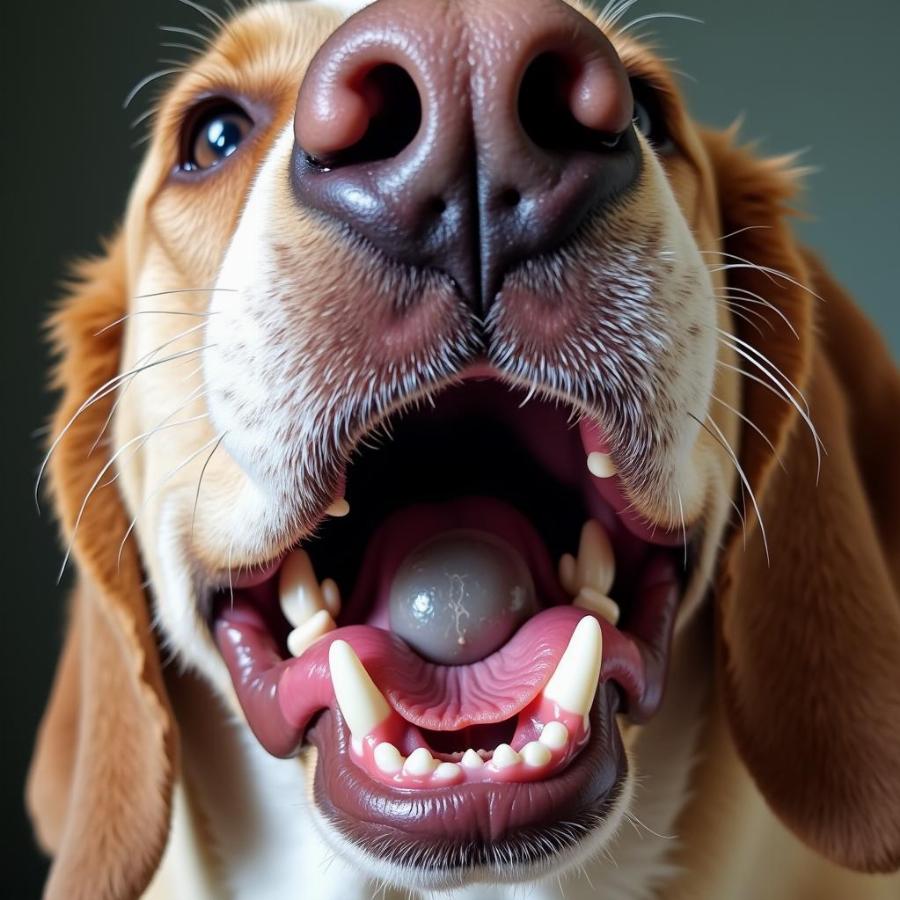Oral cancer in dogs, sadly, is a harsh reality for many pet owners. Understanding what it looks like, the symptoms it presents, and the treatment options available is crucial for early detection and providing the best possible care for your furry friend. This article aims to provide you with valuable information, including oral cancer in dogs pictures, to help you navigate this challenging situation.
Understanding Oral Cancer in Dogs
Oral cancer represents approximately 6% of all cancers diagnosed in dogs. Several types of oral tumors exist, with malignant melanoma being one of the most common and aggressive forms. Squamous cell carcinoma is another prevalent type, often affecting older dogs. Early detection is key to improving a dog’s prognosis. Knowing what to look for, including being able to recognize oral cancer in dogs pictures, can make all the difference.
Recognizing the Signs: Oral Cancer in Dogs Pictures and Symptoms
While oral cancer dogs pictures can be helpful in identifying potential problems, it’s important to consult a veterinarian for a definitive diagnosis. Some common symptoms of oral cancer in dogs include:
- Persistent bad breath: A noticeable and worsening odor from your dog’s mouth.
- Difficulty eating: Dropping food, chewing on one side, or reluctance to eat hard foods.
- Excessive drooling: More saliva than usual, often tinged with blood.
- Swelling or lumps in the mouth: Noticeable changes in the gums, tongue, or jaw.
- Bleeding from the mouth: This can occur spontaneously or after eating.
- Loose teeth: Teeth may become loose or fall out.
- Facial deformities: In advanced stages, tumors can cause noticeable swelling or asymmetry in the face.
 Khoi U Trong Mieng Cho
Khoi U Trong Mieng Cho
Diagnostic Procedures for Oral Cancer in Dogs
If you suspect your dog might have oral cancer, a veterinarian will conduct a thorough examination. This often involves:
- Physical examination: Checking the mouth, lymph nodes, and overall health.
- Biopsy: Taking a small tissue sample for laboratory analysis. This is the definitive way to diagnose cancer.
- Imaging: X-rays, CT scans, or MRI may be used to assess the extent of the cancer and check for metastasis.
Treatment Options and Dog Mouth Cancer Life Expectancy
Treatment for oral cancer in dogs varies depending on the type and stage of the cancer. Options include surgery, radiation therapy, chemotherapy, or a combination of these. Dog cancer images can help visualize the progression of the disease. Dog mouth cancer life expectancy can range from a few months to several years depending on the individual case and the effectiveness of treatment. Palliative care is also an important consideration to manage pain and improve quality of life.
What if my dog has sores in his mouth?
Pictures of mouth sores in dogs can resemble some early signs of oral cancer. Sores can be caused by various factors like infections, allergies, or trauma. It’s crucial to consult a vet to determine the cause and rule out any serious conditions like oral ulcers in dogs or cancer.
Conclusion
Oral cancer in dogs is a serious concern, but early detection and appropriate treatment can significantly improve outcomes. Familiarizing yourself with the symptoms and being able to recognize potential issues from oral cancer in dogs pictures can help you seek veterinary care promptly. Remember, your veterinarian is your best resource for diagnosis and treatment options.
FAQ
- What are the first signs of mouth cancer in dogs? Bad breath, difficulty eating, and excessive drooling are often early signs.
- Is oral cancer in dogs painful? Yes, it can be painful, especially in later stages.
- Can oral cancer in dogs be cured? In some cases, it can be cured, especially if detected early.
- What is the most common type of oral cancer in dogs? Malignant melanoma and squamous cell carcinoma are common types.
- How is oral cancer in dogs diagnosed? A biopsy is the definitive way to diagnose oral cancer.
- What are the treatment options for oral cancer in dogs? Surgery, radiation therapy, and chemotherapy are common treatment options.
- What is the prognosis for dogs with oral cancer? The prognosis varies depending on the type and stage of the cancer.
Beaut Dogs is your trusted source for comprehensive and reliable information on all aspects of dog ownership. We are dedicated to providing valuable insights into the world of canines, from breed selection to specialized care. For personalized support and expert advice, contact us at Email: [email protected]. Beaut Dogs is here to help you navigate the joys and challenges of being a dog owner.